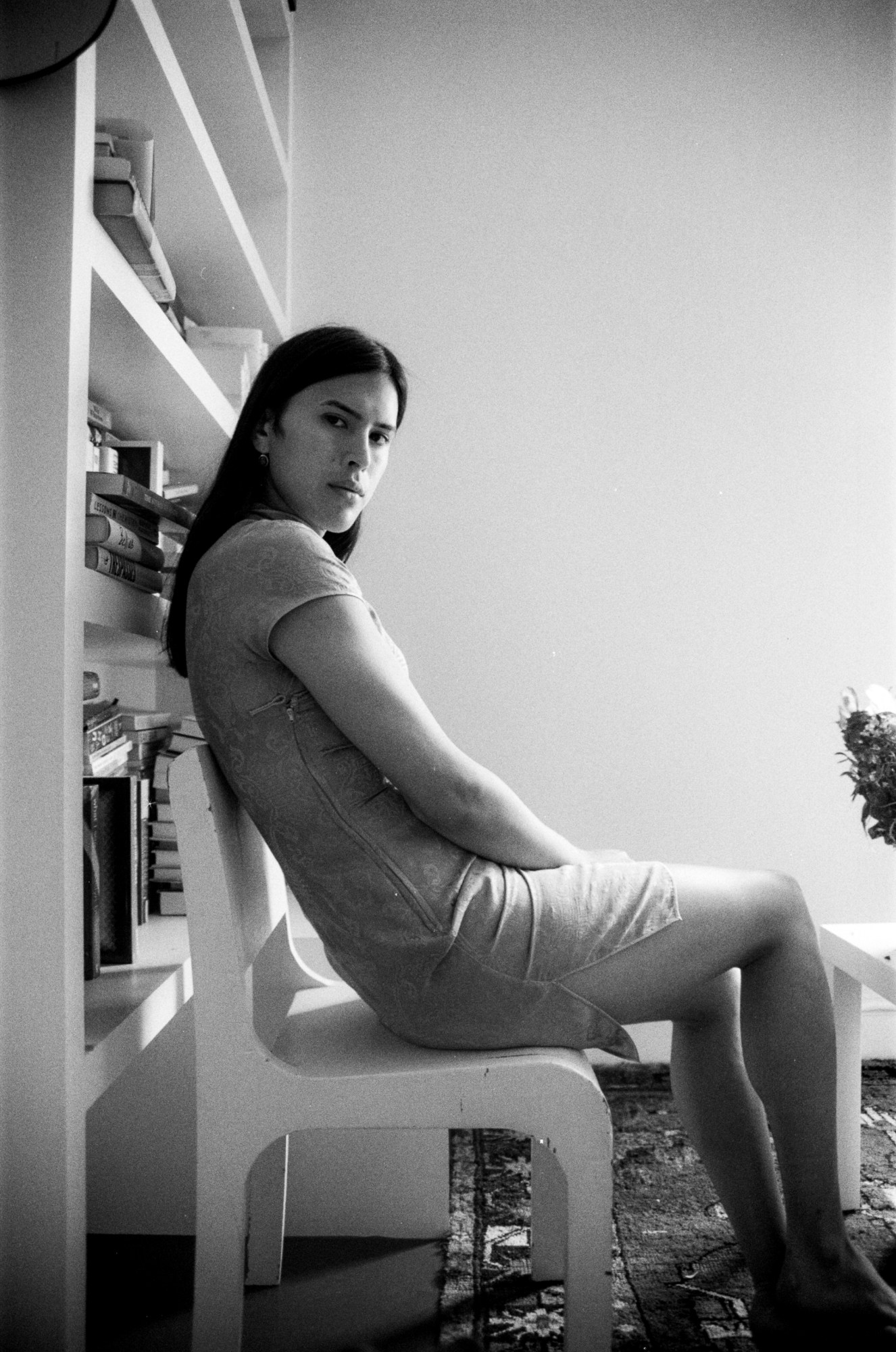The title of Nicola Dinan’s debut novel Bellies comes from the habit of animals exposing their softest and most vulnerable parts. She knows what that act of submission feels like. “Publishing a book is a very vulnerable experience,” she says. “You’re releasing something without a real sense of how the world will engage with it.”
Bellies — released this month via Transworld — follows two young people, Tom and Ming, as they meet in university as two seemingly gay men. They fall in love, and the book follows them across their rocky twenties together. A little while into their relationship, Ming transitions, and it irrevocably alters the couple’s dynamic.
Nicola is sitting on the patio of a Dalston cafe when I meet her, immersed in the soapy, much-discussed book Yellowface by R. F. Kuang. She’s only just recovered from a weekend at Glastonbury — “I had to do an interview from my tent. It was so hot, I was literally dripping with sweat” — but is wearing the chaos of the previous weekend lightly. She has dark hair that falls, like early 70s Cher, down her back and is wearing a denim waistcoat and jeans. A Carrie Bradshaw-style nameplate necklace rests on her chest.
It may be getting sold on its transness, but Bellies has much to say about young adulthood too: the loneliness, the endless grind involved in modern city living, the rise and fall of friendships. It is a novel overspilling with care and affection for its characters. Recently, an in-house email at her publisher circulated. In it, Nicola says, a “very senior cis white straight man” wrote about how Bellies helped him empathise with trans people. “I never wanted to be a teacher,” Nicola says. “It’s such a cliche to say that writing books is an exercise in raising empathy, but it feels nice that there’s evidence that can be true.”
The hype for her book is high: it’s had co-signs from the likes of Elliot Page and Shon Faye. Last year, before the final draft of Bellies was even complete, the TV rights were bought by Element Pictures, the production team behind Normal People and The Favourite. An eight-part series is in the works with Nicola writing the scripts. She’s already penned the pilot episode and they’re currently shopping the show around to broadcasters. “I think at my core I am a novelist,” she says, “but screenwriting has come quite naturally. It’s more collaborative. That’s fun because writing [books] can be quite lonely.”
The British publishing industry has been slow to publish trans novelists. “The way transition has been covered is quite limiting. It’s overly focused on a memoiristic style,” Nicola says. “I think what people are interested in, unfortunately, when it comes to someone transitioning is often the swan-like before and after physical transformation.”
Ming’s physical transition only takes up a small portion of Bellies’ complex emotional tapestry. By writing Bellies from the perspective of both Tom and Ming, Nicola has found fresh insights on well-worn territory. In telling the story this way, “I think it suddenly stops being this incredibly specific experience that only trans people go through and becomes something a bit more universal.” Tom struggles with Ming growing away from him and into her gender. They are both flawed — selfish, annoying, indecisive thinkers. Nicola seeds the internal conflicts in these characters, particularly Ming’s transition, long before their relationship reaches breaking point.

“I think the people who read Bellies and pick up those small details about Ming vis-a-vis her body are often more sensitive to these things,” Nicola says. As in, the girls, gays and theys? “Yeah,” she says, smiling. “They pick up on those really complex relationships we have to our body and really feel for Ming. A lot of other people wouldn’t, so Tom’s pain feels more familiar. It feels immediately universal, these feelings of resentment and betrayal. But the more time you have with the book the easier it is to see both perspectives.”
Though Nicola paints both Ming and Tom with light and shade, Ming is a uniquely complex and questionable trans protagonist. Readers are likely to choose sides in the messy crossfire of Tom and Ming’s relationship — including Nicola’s own partner. “Oh, he does not like Ming at all and I’m quite defensive of her,” she says, laughing. “I take the hits quite personally.” Nicola is aware that Ming is privileged; a wealthy trans woman with uncomplicated access to healthcare, a subject she consciously wanted her character to reflect on. “It’s important to me, especially with Ming who is at times a very difficult person and operates quite selfishly, that trans people should have the freedom to be pieces of shit too.”
Nicola was born in Hong Kong and grew up in Kuala Lumpur before moving to the UK at 18 to study Natural Sciences at Cambridge. “I was quite bad at the science itself,” she says. “I was good at the theory and problem-solving but I’m terrible with my hands. I couldn’t do any of the experiments.” She attempted a humanities degree before finally doing a law conversion. She trained briefly as a lawyer, before packing that in, too. “I’m a serial quitter, I know!” she says, holding her hands up. “But the only thing I haven’t quit is writing.”
She found time to work on Bellies while working at a law firm. “I was totally miserable the entire time I was there,” she says. “I was switching between Google Docs and work calls, getting in any paragraphs or even sentences that I could.” She quit her job “delusionally early” after completing the first draft, sure that Bellies would find its audience.
Between writing the scripts for the Bellies series, Nicola is already at work on her debut’s follow-up, titled Disappoint Me. Most authors are coy about their forthcoming work, but Nicola is unexpectedly eager to discuss it. “It follows two characters: Max, a trans woman in her early 30s, and Vincent, a British-Chinese man also in his early 30s,” she says. “It follows their relationship and, in particular, Max’s alienation and comfort from assimilating into this very heteronormative relationship. That narrative is told in tandem with a timeline ten years prior where Vincent had a fling with a British trans woman during his gap year.”
Nicola knows that there aren’t many authors like her out there, capable of handling stories like this with care. “It’s not like London has many half white British, half Malaysian-Chinese trans women just knocking about,” she says. She’s aware that parallels will be drawn between herself and Ming by readers eager to identify autobiographical elements in her book.
They have different lives, she insists, and are two very different people, even if she drew upon her own experiences to flesh out Ming’s emotional core. “It doesn’t always feel good to have to rehash those feelings,” she says. “But even if a novel is set in space, there needs to be some level of emotional truth. It feels necessary to expose those emotions.” She calls it a way of “living the central metaphor of the book: that you do have to expose yourself to others in order to attain a sense of closeness to those around you.”
“[The comparison] is inevitable,” she says with a shrug. “But I do think, when writing a book, there’s always going to be traces of you left behind.”
‘Bellies’ is out now in the UK via Transworld. Buy it here, or download the audiobook via Audible. It’s out in the US via Hanover Square Press on 1 August. Pre-order it here.

Credits
Photography Milo Matthew
